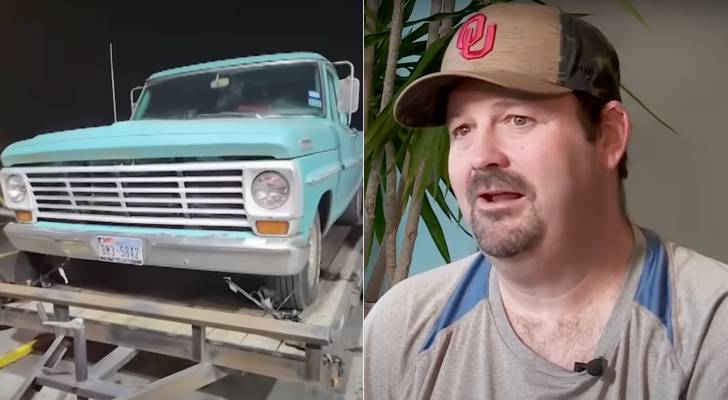Many classic car enthusiasts dream of restoring a vintage vehicle. Some do it themselves, often putting in years of work, while others hire professionals to do it for them. But sometimes things don’t quite work out the way you’d hope.
Tim Hayes’ son is a “truck kid,” as he recently shared with KFOR Oklahoma News 4. So, when his son turned 14, Hayes promised him a restored vintage truck for his 16th birthday. Hayes even found the perfect fixer-upper in February 2023: a classic 1967 Ford pickup, which he bought and took to a shop in Oklahoma City for restoration. The shop told him it would “probably be done around July,” Hayes said.
Don’t miss
It’s been nearly two years since “they ripped it down to nothing” and “just sat on it and then kept saying, ‘oh we’re waiting on … this and that,’” Hayes told News 4. Meanwhile, his son’s 16th birthday is approaching and the truck isn’t even close to ready.
During this time, the shop had been sending invoices every two to three months for work it said it was doing, billing Hayes a total of $115,000. Hayes continued to pay because the shop threatened to “Title 42” the truck if he didn’t, referring to a law that would allow the shop to take possession of the truck due to lack of payment.
Finally, in early 2025, Hayes decided to cut his losses. He picked up the unfinished truck, which required him to pay an additional $12,000 before towing it away (it’s still not drivable). Hayes said his son is disappointed because “he knows he ain’t getting the truck.”
Classic Corner Iconic Cars shares its side of the story
News 4 contacted James Voyles at Classic Corner Iconic Cars to get the shop’s side of what went down. Voyles, whose wife owns the shop, said that by paying each invoice instead of disputing them, Hayes essentially agreed to the terms.
Voyles said the shop never had a formal contract with Hayes; the delays were mostly due to part shortages and staff illnesses, and the cost was standard for this type of restoration.
The shop eventually issued a statement to News 4 saying the job required “a rebuilding of the vehicle from the ground up,” which takes a long time and often doesn’t guarantee a timeline. The statement also said that Hayes was aware of this and slowed down the process by making changes to the project and not paying his invoices on time.
“Unknown factors reveal themselves as the work is being done,” reads a portion of Classic Corner Iconic Cars’ statement. “We have always been in communication with Mr. Hayes to keep him updated on the progress and get his approval (that included costs) before moving to the next phase of work.”
As Hayes is left to deal with this unfinished prioject, his story serves as a cautionary tale for those looking to restore a vehicle with the help of a body shop.
Read more: Rich, young Americans are ditching the stormy stock market — here are the alternative assets they’re banking on instead
Do your homework
To avoid a similar situation, start by doing your homework on body shops in your area. Some restorations require highly-specialized skills and parts, so you’ll want to find a shop that has experience with your type of vehicle.
You’ll also want to look into the shop’s track record. Does the shop share before, during and after photos of previous projects on their website? Does it have positive ratings and reviews, and can the shop offer references? If possible, try to get recommendations from people you know and trust.
Visit the shop before committing to its services. Do you “click” with the shop owner? After all, you could be dealing with them for months or even years. When you visit the shop, be prepared with questions about its experience and policies regarding the restoration process.
“We’ve seen great restorations from bad shops and bad restorations from great shops,” says Carl Heiderman in Classic Motorsports. “To us, the common factors in success or failure are project management and effective communication.”
Heiderman adds that “a successful project requires three types of management: technical, financial and time.” In other words: what work will be done, who will pay for what, and what’s the project’s timeline?
Agree to the terms in writing
As Hayes noted with News 4, he didn’t have a written agreement with Classic Corner Iconic Cars that outlined the time and cost for the project. “I guess bad on my part,” Hayes said. “I probably should have got it documented on paper.”
It’s crucial to have a written agreement before the restoration begins. It should outline the scope of the project, including the work that’s to be done and an estimated timeline.
A written agreement should also detail the costs, such as hourly rates for labour and potential extra charges. A section on payment terms could include details such as who initially pays for parts, how often invoices will be issued, when invoices will be considered past due and what the consequences will be for late payments.
Make sure to look into any mechanisms that could be in place for dispute resolution and termination of the work by either party. The shop may have a standard agreement, but a restoration could entail significant time and expenses, so don’t be afraid to negotiate changes or additional clauses. It’s also a good idea to have the agreement reviewed by a lawyer.
If things start going sideways, it may be best to get out sooner rather than later, according to Heiderman. You’ll need to clearly define what you’re unhappy with before addressing it with the shop, negotiate in good faith and then decide whether to stay or cut your losses.
What to read next
This article provides information only and should not be construed as advice. It is provided without warranty of any kind.

